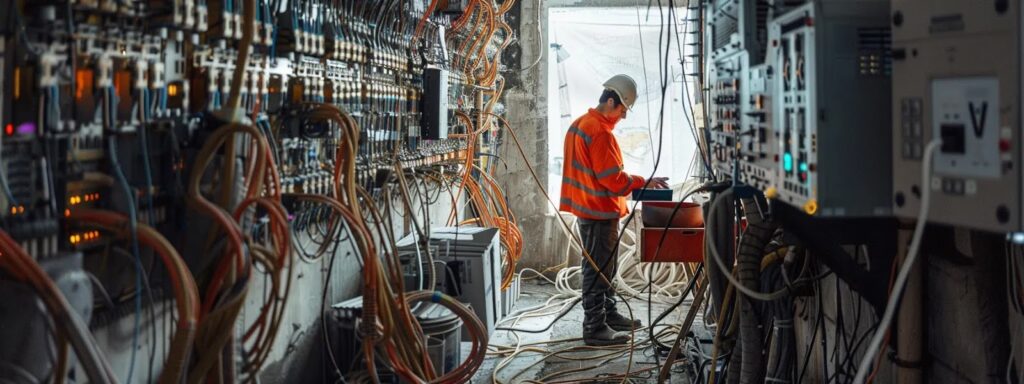Estimated reading time: 20 minutes
Essential Insights and Key Takeaways for Aspiring Electricians
- Key Takeaways
- Understanding the Roles of Journeyman and Master Electricians in California
- Educational Pathways for Electricians in California
- Certification Requirements for Journeyman and Master Electricians
- Licensing Processes and Regulations in California
- Career Progression From Journeyman to Master Electrician
- Salary Expectations and Job Opportunities
- Frequently Asked Questions
- Conclusion
Understanding the distinctions between a journeyman and a master electrician in California can significantly impact one’s career prospects. This post delves into the nuanced differences, revealing pathways and certifications unique to each. By engaging with this content, readers will learn about the diverse educational options, including vocational training at InterCoast Colleges, and understand the pivotal steps toward obtaining the necessary certifications.
Whether you’re a recent high school graduate considering the Electrical Training Program or a seasoned electrician aiming for the master’s level, this guide offers valuable insights into the Electrician Career Outlook in California. Learn how to navigate the licensing processes, what career advancement looks like, and what salary jumps you might expect, equipping you with the knowledge to power your professional growth.

Key Takeaways
- Journeyman electricians manage a vast range of electrical tasks, while masters oversee projects and teams
- Master electrician status in California requires advanced training and expertise in electrical systems
- Licensing as a journeyman or master electrician in California involves fulfilling state-specific education and exams
- Master electricians generally command higher salaries due to their managerial roles and complex project oversight
- California’s diverse electrical sector offers numerous job opportunities for both journeyman and master electricians
Understanding the Roles of Journeyman and Master Electricians in California
In California, the path to becoming a licensed electrical contractor requires a clear understanding of the Electrician Career Outlook responsibilities that differentiate a journeyman electrician from a master electrician. A journeyman, having completed their training and passed the required exam, is well-versed in performing a vast array of electrical tasks under minimal supervision. In contrast, a master electrician, who has also achieved licensure, oversees major projects and manages teams, bringing a higher level of expertise and responsibility. The subsequent sections delve into the specific duties of each role and how their day-to-day tasks compare.

Responsibilities of a Journeyman Electrician
A journeyman electrician in California shoulders the responsibility of interpreting blueprints and executing electrical wiring projects in accordance with the national electrical code. This robust understanding of electrical systems and components is critical, allowing for enhanced safety and efficacy on the job. Journeymen electricians find employment in a variety of settings, from residential to commercial, ensuring that every wire connection and safety protocol meets stringent legal standards.
With each task, journeymen electricians gauge the necessary materials and estimate the associated fee, embodying precision in electrical work’s practical and financial aspects. This approach to their craft not only adheres to the law but also establishes trust with clients, laying the groundwork for a thriving career in the electrical industry. Prospective journeymen diligently navigate the hands-on complexities of the trade, reinforcing their expertise through each power system they successfully energize.
Duties of a Master Electrician
Master electricians in California distinguish themselves as the vanguard of the electrical profession, complementing hands-on work with advanced leadership roles. Their comprehensive proficiency not just meets but exceeds the standard certification requirements, enabling them to mastermind large-scale projects in various sectors, including residential, commercial, and industrial construction. Regulated by stringent state laws, these electricians interpret complex electrical systems, ensuring that installations are executed flawlessly and conform to the highest safety and efficiency standards.
Beyond mere compliance with regulation, master electricians embrace the mentorship of less seasoned professionals, guiding them through intricate training that forms the backbone of the industry’s future. They craft detailed plans for electrical systems, oversee the procurement of materials, and maintain constant communication with project stakeholders to ensure optimal outcomes. The responsibilities vested in a master electrician encapsulate years of experience, a deep commitment to the craft, and a forward-thinking approach to electrical solutions:
| Experience Required | Skills | Responsibilities |
|---|---|---|
| Extensive field experience | Strategic project planning | Leading construction projects |
| Advanced professional training | Mentoring and training newcomers | Quality control and assurance |
| Understanding of local and national regulations | Expertise in electrical code compliance | Managing project budgets and timelines |
Comparing Day-to-Day Tasks
On a typical day, a journeyman electrician in California may find themselves deeply engaged in the practical application of electrical engineering principles. This might involve installing and maintaining electrical systems, troubleshooting wiring problems, and ensuring adherence to the electrical code. Their diverse tasks, from threading conduits to programming control systems, provide valuable hands-on experience and a broad understanding of real-world electrical issues.
A master electrician’s daily agenda, conversely, often revolves around project management and strategic oversight. With a responsibility to uphold the integrity of electrical engineering projects, they diligently ensure compliance with the latest electrical code, supervise teams, and collaborate closely with other professionals to achieve operational excellence. Their role is to anticipate challenges and deliver solutions that meet both safety standards and client expectations:
| Journeyman Electrician Tasks | Master Electrician Tasks |
|---|---|
| Installation of wiring and fixtures | Project management and oversight |
| Diagnosing and repairing electrical problems | Strategic planning and compliance |
| Following electrical codes and safety standards | Collaboration with architects, engineers, and contractors |
The journeyman and master electricians shape the backbone of California’s electrical industry, wielding tools and expertise with precision. Now, we turn to the educational paths that forge such skilled hands, crucial for those ready to connect wires and futures in the Golden State.
Educational Pathways for Electricians in California

The pathway to becoming a proficient electrician in California involves critical steps in education and training. Entry-level education requirements set the foundation for aspiring electricians, who must then engage in comprehensive apprenticeship programs to gain practical experience. For those aiming to achieve master electrician status, advanced training is essential, delving into complex project management and regulatory compliance. This section outlines the educational requisites and programs available, offering insight into the progression from novice to expert within the electrical field.
Entry-Level Education Requirements
California mandates an essential foundation of educational prerequisites to begin a career in electrical work. Aspiring electricians are expected to hold a high school diploma or an equivalent, such as a GED. This initial step is crucial as it paves the way for further specialized training. The solid grounding in mathematics and science received in high school will support candidates in understanding the technicalities of electrical systems.
After completing high school education or equivalent, prospective electricians can enroll in vocational training programs. These programs offer a blend of theoretical knowledge and hands-on practice, establishing a robust platform for future apprenticeship opportunities. In these vocational schools, individuals start to grasp the complexities of electrical work, allowing them to proceed to more advanced certifications and, eventually, to pursue licensure as journeyman electricians.
Advanced Training for Master Electricians
Advancing from a journeyman to a master electrician in California involves rigorous training that delves deeply into electrical systems management and leadership skills. This advanced training typically encompasses additional coursework and practical experience focused on design, advanced electrical theory, codes and standards interpretation, and business and financial management. The education obtained in these programs better prepares electricians to handle the complexities of overseeing large projects and ensures their knowledge remains cutting-edge in an evolving field.
Those preparing for a master electrician certification often benefit from a blend of formal education and field experience. This stage of professional development is essential for understanding state-specific regulations, the National Electrical Code (NEC), and project management best practices. By gaining proficiency in these areas, electricians position themselves as valuable assets to potential employers, prepared to handle both the logistical and technical demands that supervising high-level electrical projects entails.
Now, the path is clear for those aspiring to work with currents and circuits. Next, let us focus on the map – the essential certifications that mark the milestones of mastery for electricians.
Certification Requirements for Journeyman and Master Electricians

In California, the pathway to becoming an electrician is marked by specific certification requirements, each demanding varying degrees of experience and expertise. The process begins with obtaining a Journeyman Electrician Certification, which allows individuals to work independently on a variety of electrical tasks. As electricians aspire to reach the pinnacle of their profession, they must navigate through the comprehensive Master Electrician Certification process, a testament to their command over far-reaching project management skills. Each milestone requires diligent exam preparation, for which various resources are available to bolster the candidates’ success rate. This section will concisely explore the steps involved, exam preparation strategies, and the supportive resources tailored to these critical professional achievements.
Steps to Obtain a Journeyman Electrician Certification
To begin the journey of becoming a journeyman electrician in California, one must first accumulate a combination of educational and practical experiences as stipulated by the state. This includes completing an accredited Electrical Training Program, which often involves both classroom learning and hands-on practice. After fulfilling the educational requirements, the next critical step is registering for and passing the Journeyman Electrician Certification Exam, which assesses the individual’s proficiency with the National Electrical Code (NEC) and electrical theory:
| Education & Training | Registration for Exam | Exam Proficiency |
|---|---|---|
| Completion of accredited electrical training | Submission of application with proof of experience | Understanding of NEC and electrical theory |
Successful certification exam passage grants the journeyman electrician the legitimacy to work independently and is often viewed as a foundational achievement in an electrician’s career. Having reached this level, they are recognized by the state as competent to execute electrical installations and repairs, meeting the safety and quality standards required within the industry. This certification, while valuable, is only a precursor to the advanced qualifications necessary for those aspiring to become master electricians in California.
Process for Master Electrician Certification in California
The process for Master Electrician Certification in California is an advancement for those who have already achieved journeyman status and wish to elevate their professional standing. It typically requires additional years of work experience as a journeyman electrician and often entails further education or training in electrical theory, management, and the application of current electrical codes. Aspiring master electricians must demonstrate a comprehensive understanding and mastery over sophisticated electrical systems and project management skills.
To apply for the Master Electrician Examination, individuals must meticulously document their experience and submit an application to the relevant California state board. This exam is more extensive and covers a broader range of topics than the Journeyman Electrician Certification Exam, emphasizing leadership, advanced electrical system design, and a strong grasp of the National Electrical Code (NEC). Once certified, master electricians hold the professional credentials to manage large-scale electrical projects and lead teams with confidence:
| Requirement | Description | Objective |
|---|---|---|
| Years of Experience | Extended work as a journeyman electrician | Proving field competence for advanced challenges |
| Educational Advancement | Further study in electrical engineering and management | Mastering complex systems and leadership roles |
| Master Electrician Examination | Comprehensive testing on a wider range of electrical topics | Certification of expertise to oversee extensive projects |
Exam Preparation Tips and Resources
To prepare for the Journeyman Electrician Certification Exam, candidates should focus on a study routine that includes reviewing the National Electrical Code (NEC) and solving practice problems related to electrical theory. Engaging with online forums and study groups can provide peer support and insights into the types of questions that commonly appear on the exam. This communal learning approach is often highlighted as a key contributor to exam success.
For the Master Electrician Certification, resources such as advanced electrical code seminars and project management workshops can be invaluable. These preparation materials aid electricians in grasping complex topics and staying updated on the latest industry standards. Comprehensive preparation for this exam entails a blend of theoretical knowledge and practical leadership skills, underlining the candidate’s readiness to assume the mantle of a master electrician:
- Regularly update skills with the latest NEC changes and amendments.
- Partaking in mock exams and timed practice sessions.
- Attend workshops for advanced electrical techniques and management strategies.
- Use study guides and textbooks authored by reputable electricians and educators.
Passing exams is the first hurdle. Next, California’s electricians face the challenge of licensing, a landscape with its own rules.
Licensing Processes and Regulations in California

In California, the journey from electrician trainee to journeyman to master electrician is marked by specific licensing steps. Securing a journeyman electrician license requires meeting educational and experiential criteria, followed by exam success. Master electricians must then demonstrate advanced expertise and manage more complex electrical systems. Staying abreast of state regulations guarantees compliance in this regulated profession. This subsection outlines how to apply for a license at each level and maintain it within California’s legal framework.
How to Apply for a Journeyman Electrician License
To initiate the process of acquiring a Journeyman Electrician License in California, candidates must first satisfy the requisite combination of educational and practical experience as defined by the state. This typically involves completion of a state-approved electrical training program, supplemented by hands-on work under the guidance of a licensed electrician. The emphasis is on ensuring applicants possess a foundational grasp of electrical theory and safety standards mandated by California regulations.
Once the educational and experiential prerequisites are met, the aspiring journeyman electrician must register for and pass the state-specific certification exam. The examination tests knowledge of the National Electrical Code (NEC), as well as practical aspects of electrical work, reflecting the candidate’s preparedness to conduct installations and repairs in compliance with California’s strict industry standards. Here are the steps to follow for a smooth application process:
- Complete the required hours of vocational training or apprenticeship.
- Compile and submit proof of work experience and education.
- Fill out the journeyman examination application through the state’s licensing board.
- Study thoroughly for the certification exam, with a focus on the NEC and California electrical codes.
- Sit for and pass the journeyman electrician examination.
Licensing Requirements for Master Electricians
To attain the prestigious Master Electrician License in California, candidates are required to build on their journeyman experience with additional years of practical work. They must also exhibit proficiency in complex electrical systems and project management by passing the stringent Master Electrician Examination. These requirements ensure that master electricians are not only adept at high-level technical work but are also ready to manage and direct large-scale electrical projects within the state’s regulatory framework.
As California sets high standards for licensure, individuals aiming for the Master Electrician License further their education through specialized training programs or courses tailored to complex electrical principles and business practices. Mastery of the National Electrical Code, demonstrated leadership ability, and a thorough understanding of state-specific electrical laws are corroborated through this multifaceted evaluation process, signifying their readiness to take on the role of a master electrician with adeptness and authority.
Staying Compliant With State Regulations
For electricians in California, staying compliant with state regulations not only ensures legal operation but also fosters professional credibility. Electricians must routinely update their knowledge of the California Electrical Code, which may involve attending continuing education courses designed to keep professionals abreast of the latest standards. Such diligence aids in maintaining licensure and assures clients that electrical work will be performed to the highest safety and quality benchmarks.
Both Journeyman and Master Electricians are compelled to renew their certifications periodically, a process that often requires proving continuous employment in the field and completion of relevant educational updates. The renewal process acts as a checkpoint, affirming that electricians uphold the required competencies and adhere to evolving regulatory demands. This ongoing commitment to compliance mitigates the risk of legal infractions and underscores an electrician’s dedication to exemplary service.
Navigating California’s licensing regulations is the first victory. Up ahead lies the climb from journeyman to master electrician, each step a mark of prestige and expertise.
Career Progression From Journeyman to Master Electrician

The profession of electricians in California presents an opportunity for advancement from journeyman to master electrician, each with its own set of requirements and rewards. Gaining experience as a journeyman is the initial step, where individuals hone their skills and knowledge. Subsequently, developing skills needed for a master electrician becomes paramount, as the role demands comprehensive management and technical abilities. Advancing one’s certification can lead to numerous benefits, including higher earning potential and leadership opportunities, which are further detailed in the sections below.
Gaining Experience as a Journeyman
In California, a journeyman electrician’s period of apprenticeship is rich with opportunities to acquire hands-on expertise in a broad spectrum of electrical tasks. This invaluable experience is garnered through careful supervision and the execution of installations and repairs, grounding journeymen in the practical application of the National Electrical Code (NEC) and state-specific safety regulations. As these professionals gain knowledge and skills across various electrical systems, they position themselves for upward career mobility within the industry.
The journeyman phase is critical as it provides the empirical scaffolding for a progression to a master electrician. Daily exposure to technical challenges and problem-solving in diverse work environments, such as residential, commercial, and industrial settings, equips them with a panoramic view of the trade’s requirements. Achieving mastery in these foundational tasks establishes both the credibility and the confidence necessary to tackle the more complex responsibilities associated with becoming a master electrician in the state of California.
Developing Skills Needed for a Master Electrician
To advance to a master electrician in California, one must develop a comprehensive skill set that encompasses both technical proficiency and leadership acumen. Mastery of the National Electrical Code (NEC) is essential, as is the ability to design, oversee, and ensure compliance across complex electrical projects. A master electrician must possess adept problem-solving capabilities and excel in coordinating with other construction professionals to execute seamless project deliverables.
Further, as master electricians in California are responsible for mentoring and guiding less experienced electricians, strong communication and training skills are imperative. They must be capable of conveying intricate electrical concepts and industry best practices effectively. These skills, combined with a deep understanding of project management, budgeting, and safety regulations, enable them to lead projects to successful completion while upholding the highest standards of the trade.
Benefits of Advancing Your Certification
Securing a Master Electrician certification in California is often linked to enhanced earning potential and job stability. With this qualification, individuals distinguish themselves, commanding higher wages due to their capability to manage larger, more complex projects and their potential to assume leadership roles within their organizations. Such advancement substantiates their depth of knowledge and adaptability within the electrical trade:
| Aspect of Career Enhancement | Impact of Master Electrician Certification |
|---|---|
| Earning Potential | Increased due to advanced skills and expertise |
| Job Stability | Strengthened by the ability to lead and manage complex projects |
| Leadership Opportunities | Expanded through the certification’s recognition of expertise |
Advancing to a Master Electrician also unlocks new avenues for professional development and networking opportunities. Certified master electricians can serve as authoritative ps in the industry, contributing to educational forums, leading training programs, and influencing regulations. Hence, this progression not only elevates their individual status but also offers a platform to shape the broader landscape of the electrical field in California.
Your mastery as an electrician opens more than just circuit panels; it unlocks potential for greater earnings. Let’s examine the financial rewards and growing job markets poised to greet you as a master of the trade.
Salary Expectations and Job Opportunities
In the dynamic landscape of California’s electrical industry, understanding salary expectations and job opportunities is essential for those charting a career as electricians. The earnings potential for journeyman electricians reflects their proficiencies and scope of work, while income levels for master electricians generally showcase the financial benefits of advanced expertise. This section dissects these financial prospects, alongside the various employment opportunities afforded to licensed electricians within the state, supplying readers with valuable insights into the tangible rewards of career progression in this field.
Earnings Potential for Journeyman Electricians in California
The earnings potential for journeyman electricians in California is a reflection of the critical skills and hands-on experience gained through rigorous training and education. Typically, these skilled professionals earn a median salary that is competitive within the trade industries, with variation depending on factors such as geographic location, specialization, and years of experience within the field.
Furthermore, journeyman electricians in California can expect their income to increase with time as they sharpen their skills and build a reputation for excellent workmanship. The demand for electrical work in California, paired with ongoing construction and green energy projects, sustains a robust job market, enabling journeymen to leverage their certification for higher wages and job advancement opportunities.
Income Levels for Master Electricians
Master electricians in California might see a significant increase in income compared to their journeyman counterparts, a direct result of their advanced certifications and heightened responsibilities. This upper echelon of electricians is generally rewarded for their ability to manage complex electrical systems and lead large projects, with salary offerings that reflect their expertise and leadership. It is the combination of heightened technical knowledge and capacity for supervisory roles that establish their superior earning potential within the industry.
The state’s diverse economy creates lucrative opportunities for master electricians, particularly in burgeoning sectors such as commercial development and renewable energy. These seasoned professionals can expect compensation that aligns with their extensive experience and the critical role they play in ensuring project success and electrical safety. With the right blend of experience, expertise, and ongoing professional development, master electricians in California are well-positioned to optimize their income levels and secure their financial futures.
Exploring Employment Opportunities in the State
California offers a flourishing job market for electricians, reflecting the state’s robust demand for skilled labor in residential, commercial, and industrial sectors. Journeyman electricians, having secured certification, find ample opportunities for employment in construction, system maintenance, and energy management fields. Master electricians, on the other hand, are sought after for project leadership roles and complex system design, enjoying an expansive range of job prospects beyond hands-on electrical work.
The state’s commitment to sustainable energy initiatives and infrastructure development further generates job growth in niche electrician fields such as solar panel installation and smart home technology. Master electricians with a pulse on technological advancements and a dedication to craftsmanship are invaluable assets to employers, anchoring the industry’s push toward innovation and efficiency:
| Sector | Journeyman Electrician Opportunities | Master Electrician Opportunities |
|---|---|---|
| Residential | Installation, Repair, Upgrade | System Design, Project Supervision |
| Commercial | Code Compliance, Maintenance | Project Management, Compliance Consulting |
| Industrial | Heavy Machinery, Safety Systems | Energy Management, Operations Oversight |
| Renewable Energy | Solar Installations, Energy Storage | Smart Grid Technology, Renewable Systems Integration |
Frequently Asked Questions
What educational steps must one take to become an electrician in California?
To become an electrician in California, you must complete an approved electrical training program, obtain an Electrical Trainee card, accumulate 8,000 hours of supervised work experience, and pass the Journeyman electrician exam.
Are there different certification requirements for journeymen and master electricians?
Yes, there are different certification requirements for journeymen and master electricians. A journeyman electrician must complete an approved training program, gain 8,000 hours of supervised work experience, and pass the journeyman exam. To become a master electrician, additional experience is required, often including several more years of work as a journeyman and passing a more advanced licensing exam covering more complex electrical systems and management responsibilities. Specific requirements can vary by state.
How does one obtain a master electrician license in California?
To obtain a master electrician license in California, one must first gain journeyman-level experience, complete a state-approved electrical training program, and then pass the certification exam administered by the state.
What salary differences exist between journeymen and master electricians?
Master electricians typically earn higher salaries than journeymen due to advanced credentials, expertise, and responsibilities, often overseeing projects and teams.
Conclusion
In California, becoming a journeyman electrician marks the first major step in a professional’s electrical career, signifying both technical proficiency and adherence to safety standards. Progressing to a master electrician implies a higher earning potential, a leadership capacity, and advanced skills in managing complex electrical projects. Master electricians play a pivotal role in the industry, driving innovation and shaping the future of electrical work through expertise and experience. Understanding the distinctions between these certifications is essential for individuals aiming to navigate California’s thriving electrical job market and propel their careers forward.
Click here to learn more about our Electrical Training Program.

